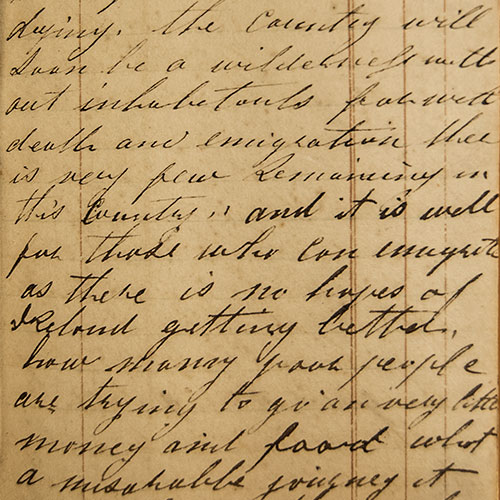Although the keeper of this diary is unknown, it is clear from his entries that he was Protestant—among his spiritual meditations, he reflects that the power of the Catholic priests, in keeping the true word of God from the majority of the population, was to blame for the poverty and strife suffered by the peasantry. That the Great Hunger was due to divine providence and a means to reduce Ireland’s population problem was not an uncommon belief, especially in the London newspapers. “True religion,” he writes in March 1849, “has left Ireland. I wonder what will become of the poor. There is no prospect for them, only death as famine & pestilence has covered the land.”
The author of the diary had family in Ireland, while he spent time living in England. The poverty of the peasantry does not seem to directly affect him or his family, but he does not appear to be without sympathy. He notices the effects of the Great Hunger on the population--starvation itself and the resulting disease and mass emigration that truly decimated the population: “the number of poor is enough to make a person tremble…who...sees such misery without any means to relieve them” (December 7, 1848).
In May 1849, he notes that 490 deaths occurred in the poor houses in one week alone: “the country will soon be a wilderness without inhabitants for with death and emigration there is very few remaining in this country and it is well for those who can emigrate as there is no hope of Ireland getting better.” Queen Victoria made a special visit to Dublin in August 1849—her first visit to Ireland—in an effort to show solidarity and support in the Famine’s aftermath. The author was in Dublin at the time: “what a pleasing thing it is to see the people so happy after all has been said about her magesties [sic] visit.”
Among other significant events during this period, the author refers to the Young Irelander Rebellion of 1848 and William Smith O’Brien’s sentencing in July 1848 for sedition. The author was present in Dublin during Daniel O’Connell’s funeral. Despite O’Connell having been a champion of the Catholics in Ireland, the author refers to him with respect, “bid[ding] adieu to the Liberator.”


